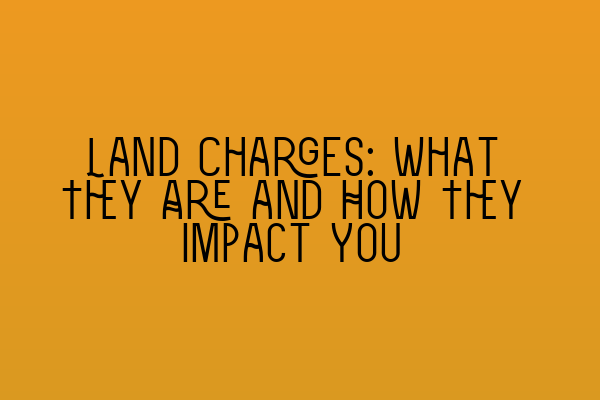Land Charges: What They Are and How They Impact You
Welcome to the blog of SQE Property Law & Land Law! In this article, we will be discussing an important aspect of property ownership and transactions – land charges. Whether you are a property owner, buyer, or seller, understanding land charges is crucial in ensuring a smooth and successful property transaction. So, let’s dive in and explore what land charges are and how they can impact you.
What are Land Charges?
Land charges refer to legal interests or obligations that are registered against a property or land. These charges act as a notice to inform potential buyers or lenders about any restrictions or other interests associated with the property. They are usually registered with the Land Charges Department of the relevant government authority, ensuring that interested parties can access and review them when necessary.
There are different types of land charges, each with its own implications. Some common types of land charges include:
1. Restrictive Covenants: These are specific conditions or limitations imposed on the use of the property. For example, a restrictive covenant might prohibit the property owner from building a certain type of structure or using the land for commercial purposes. It’s essential to be aware of any restrictive covenants that may affect your property plans, as violating them can lead to legal consequences.
2. Notices: Notices are registered to alert potential buyers or lenders to specific matters related to the property. For instance, a notice might be registered to inform interested parties that a third party has claimed an interest in the property or that legal proceedings are underway that could affect the property’s ownership.
3. Bankruptcy: If a property owner declares bankruptcy, a land charge can be registered against the property to secure any debts owed by the owner. This charge ensures that creditors have a legal claim to the property, even if it is sold or transferred.
4. Mortgages: When a property is used as security for a mortgage loan, the mortgage charge is registered against the property. This charge establishes the lender’s legal right to the property until the loan is repaid. If you are purchasing a property with an existing mortgage charge, it’s crucial to understand your responsibilities and obligations as the new owner.
How Do Land Charges Impact You?
Land charges can have various impacts depending on your role in a property transaction. Here are a few scenarios where land charges are particularly relevant:
1. Property Buyers: As a property buyer, it’s essential to conduct thorough due diligence to identify any existing land charges. By reviewing the registered charges, you can assess the potential implications they may have on your ownership and use of the property. Additionally, lenders often require a search of land charges before approving a mortgage application to ensure the property’s marketability and safeguard their investment.
2. Property Sellers: If you are selling a property, it’s crucial to disclose any known land charges to potential buyers. The failure to disclose relevant charges can lead to legal disputes and potentially impact the successful completion of the transaction. Sellers should provide accurate and complete information about all registered land charges to avoid any issues during the sale process.
3. Lenders: Lenders, such as banks or mortgage providers, rely on land charges to assess the risk involved in lending against a property. They will conduct searches to identify any charges that could affect the property’s value or marketability. Lenders may require additional assurances or impose conditions based on the registered land charges before approving a mortgage loan.
It’s worth mentioning that certain land charges may also have time limits or conditions that can affect their validity or enforceability. Therefore, seeking legal advice from a qualified property solicitor is crucial to fully understand the implications of any land charges in your specific situation.
At SQE Property Law & Land Law, our expert solicitors can guide you through the complexities of land charges and ensure a smooth property transaction. Our comprehensive SQE 1 and SQE 2 preparation courses provide extensive knowledge on property and land law, preparing aspiring solicitors for their upcoming exams.
For more helpful resources related to SQE exams, practice exam questions, and mock quizzes, check out the following articles:
– SQE 1 Practice Exam Questions
– SQE 1 Practice Mocks FLK1 FLK2
– SQE 2 Preparation Courses
– SQE 1 Preparation Courses
– SRA SQE Exam Dates
In conclusion, understanding land charges is crucial for both property buyers and sellers. By being aware of registered land charges, you can make informed decisions, mitigate potential risks, and ensure a successful property transaction. If you are in need of expert legal advice or assistance with land charges or any other property law matters, do not hesitate to contact SQE Property Law & Land Law.
